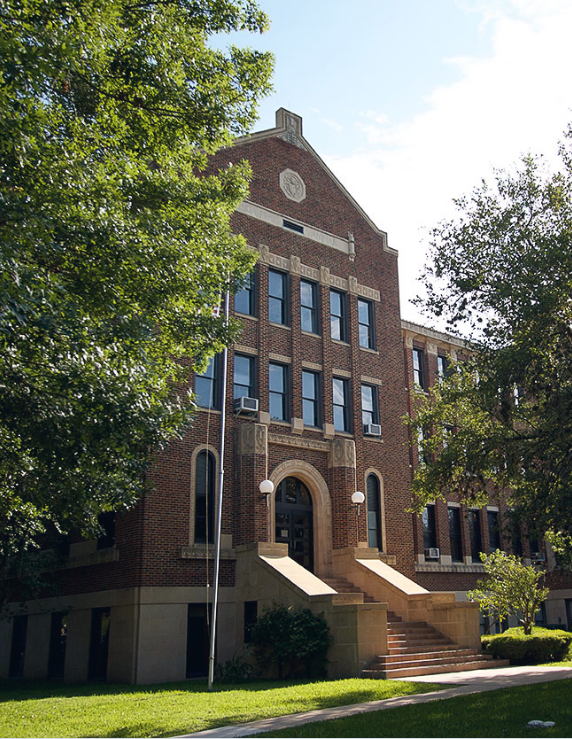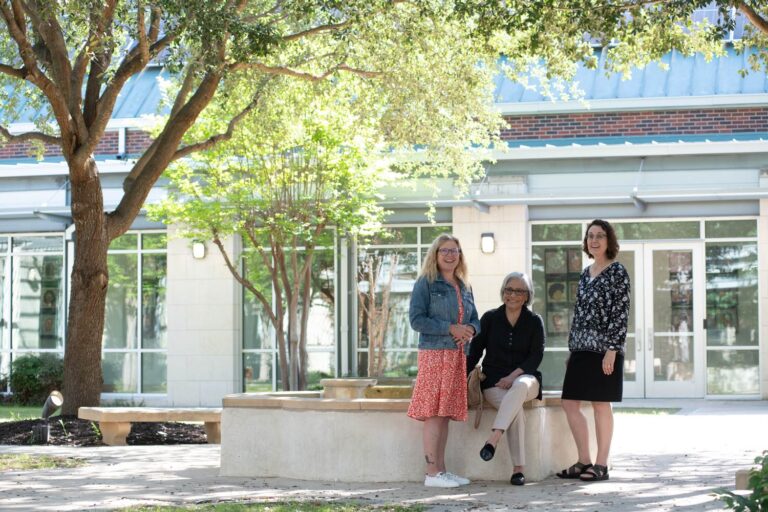“I prefer simply to tell you that I consider myself primarily a priest who wants to minister as concretely and directly as possible with and form the people I love.”
Gabrielle Earnshaw, who edited a collection of 204 of Henri Nouwen’s nearly 4,000 letters to people all over the world, said they provide a a glimpse of his view of a spiritual life and a satisfying congruity with the personality his readers have found in his 39 books.
Earnshaw, the founding curator of the Henri J.M. Nouwen Archives and Research Center at the University of Toronto’s St. Michael’s College until she resigned in 2016, addressed some 400 people June 20 at Oblate School of Theology’s 2017 Summer Institute on “The Life and Spirituality of Henri Nouwen.”
Nouwen defined the spiritual life, she explained, as “a life in which the Holy Spirit will guide us and give us the strength and courage to keep saying yes to the great question, ‘Can you drink this cup?’ Can you drink your life to the full, no matter what it brings? In other words, the spiritual life is a creative space for listening to God’s voice in the midst of one’s life, especially in our darkest times. Henri said it’s drinking our cup of joy and sorrow and claiming our life as a source of hope or healing.”
The Dutch priest wrote 39 books, which have sold 7 million copies in 30 languages. She showed the covers of two that have been published in Japanese and Arabic to illustrate the width of Nouwen’s appeal. “Henri appealed to people because his writing is personal and confessional; like us, Henri didn’t have it all together. He struggled with loneliness, anxiety and a restless search for belonging. What stands out for me about Henri is his ability to reach out across all political and religious backgrounds. His readers are Catholics, Evangelical Protestants and everyone in between,” Earnshaw said.
He was a man of many paradoxes, she pointed out—a Catholic priest who didn’t wear a Roman collar or any other religious symbols a Dutchman with a thick accent who never lived in Holland after his 38th birthday; an academic who taught in Ivy League universities and started classes with a Jesus prayer and a Taize chant; and a contemplative who was a nervous wreck.
She said he had keen psychological insights but never fixed himself; he wrote much about intimacy while struggling to claim his own sexual identity within the framework of the Roman Catholic priesthood. To first readers, Earnshaw said, “he seems like a best friend who listens to their pain and isn’t scandalized by it. He relieves our own suffering by being brutally honest with his own.”
Earnshaw edited Love, Henri: Letters from a Spiritual Life, a collection of 204 of Nouwen’s letters written between 1985-1996, published by Penguin Random House in October 2016. “It’s about like T.S. Eliot, who said, ‘We shall not cease from exploration, and the end of all our exploring will be to arrive where we started, and know the place for the first time,’” she said.
Nouwen wrote to a wide variety of readers: to ministers, activists, prisoners, friends, colleagues, students, businesspeople, homemakers, elders, the sick and caregivers; but no matter to whom he was writing, Earnshaw commented, “I began to notice that one of Henri’s great strengths was his capacity for seeing. He made most people he met, in person or in letters, feel seen and understood, satisfying one of the deepest longings of the human heart.”
The archivist said that Nouwen loved letter writing and saw it as integral to friendship. “Letters are a way to create unity and to show care and concern. He felt that words had such a power to connect one heart with another. Letters were so important to Henri that, by the end of his life, he had 16,000 incoming letters filed away.”
The Henri Nouwen Archives include about 4,000 of his own letters to various correspondents, of which 3,500 were donated from recipients around the world. Earnshaw chose the 204 for her book based in how deeply they touched her heart and whether they provided a glimpse of how Nouwen lived his own struggles, noting that “Henri lived by the maxim ‘Lay down your life for your friends.’”
Earnshaw interrupted her lecture at different points to allow Joe Abbey Colborne, a Toronto Baptist pastor, to read several letters while acting the part of Nouwen writing the letters at a desk.
One was to a friend named Richard, a historian, human rights activist and an atheist “Henri grappled with the relationship between contemplation and action, social justice and prayer, and living out his seminal insight that it is our weakness and vulnerability that connects us to God, to ourselves and to others,” Earnshaw observed.
The letter comments on his own daily life at the Genesee Trappist monastery. Its continuing silence gave him a renewed sense of life. He wrote about the manual work in the bakery and the fields and the many hours for prayer and meditation, the chance to read, study and write without interruption and the very good spiritual guidance of Father John Eudes Bamberger, OCSO, the abbot.
Nouwen says the silence of the abbey has brought him back to basic connections and ideas that make him experience God’s presence in his life more directly than before and convinced him that “it’s good for me to be physically exhausted once in awhile.” It connects him with others who experience that regularly, which he does not. At the abbey, Nouwen feels more in touch with oppression and suffering in Chile, Cyprus, South Africa and other trouble spots around the world.
Nouwen’s personal and honest tone in his journals from the Genesee abbey struck a chord with readers and helped establish his career as a spiritual writer and teacher, particularly about the interplay between contemplation and action.
After his return to Yale, he wrote to Jim, a good friend and former teaching assistant. Earnshaw said Nouwen responded to Jim’s struggle with faithfulness and questions of where to put his energy, about his doctorate and his spiritual dryness.
“This letter shows Henri’s approach to helping people. He suggests that Jim shift his focus. This is trademark Nouwen. He helps people to ask the right questions and consider carefully where to put their awareness and attention.” He underscores that in every situation, we have choices, and that once we make them, we should be faithful to them, the archivist said.
“Let me start by disagreeing with you,” Colborne read from the letter, prompting laughter from the audience. “I do not think that a life of faithfulness in response to God is a very complicated affair. I believe it is a very simple affair, and so it is very hard. Maybe it’s not much more than a play with words to help me express myself better to you—a simple-minded, simple-eyed commitment to God is all that counts. Maybe we’ve become, especially in academics, so addicted to analysis, to sorting out the many elements of our problems that we lose sight of the unum necessarium (the one necessary thing).”
Nouwen wrote that naming demons is not the initial and greatest chore as Jim supposes. “It is more important to keep our eyes on God, and him alone. We’ll never overcome the demons by analyzing them, but only by forgetting them in an all-consuming love for God. Demons love to be analyzed because it keeps our attention directed to them.” Nouwen expressed his conviction that the heart, soul and mind can never be divided between God and neighbor or anything else. and “God wants our love without any reservation.”
Nouwen says his only fear is that Jim will fight his fight on the wrong front. “Don’t spend energy on fighting demons; give all you have to God. There is no other way in finding out where to go or what to do to understand your pain. My personal feeling is that you are in the right place doing the right thing and it would be a temptation to quit.”
Earnshaw observed three key points in this letter: One of the most important, which occurs throughout his ministry, is the importance of where we direct our gaze–on God; second, in matters of faith, it’s vital to move from the head to the heart, from analysis and complexity to the simplicity of loving God; and third, everyone needs a spiritual discipline that includes solitude, prayer and a community of fellow believers.
In Peru in 1982, Nouwen received a letter from Mark, a doctoral student who was including a chapter on Nouwen in his dissertation. Nouwen ignored Mark’s list of canned questions, Earnshaw said, and instead wrote a perfect summary of how he saw his priesthood and his vocation.
The archivist noted that Nouwen was a genius as naming what ailed his correspondents. In this letter, he writes, “I’m trying to put words to what often remains hidden under the threshold of consciousness.” His background as a psychologist undergirded his perceptiveness about the human condition, she said, but predominantly, he was a many of intimacy and relationship.
“Instead of answering your questions,” he wrote to Mark, “I prefer simply to tell you that I consider myself primarily a priest who wants to minister as concretely and directly as possible with and form the people I love.”
Nouwen wrote that he saw his priesthood as a way of being present to people and noted that “Jesus’ invitation to lay down my life for others has always meant more to me than physical martyrdom. I have always heard those words as an invitation to make my own struggles, my doubts, my hopes, my fears, my joys and my pains and my moments of ecstasy available to others as a source of consolation and healing.”
Nouwen wrote that he always believed that the center of the Christian faith is not that Jesus came to take away our pains but that he came to share them. “I’ve always tried to manifest this divine solidarity by trying to be present to people in their struggles as much as possible. It’s most important to me to be with people where their joy and pain are experienced and have them become aware of God’s unlimited love,” he wrote.
Earnshaw said she thinks of this letter as Nouwen’s personal credo. “It’s all there–his emphasis on being present to people, his fundamental alignment with Jesus’ invitation to use his own struggles for the co solution and healing of others.
By J. Michael Parker



